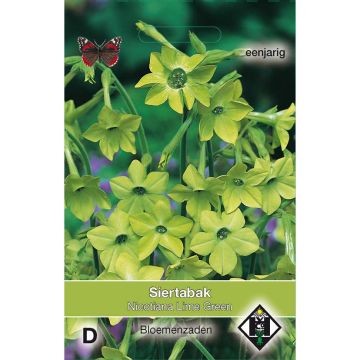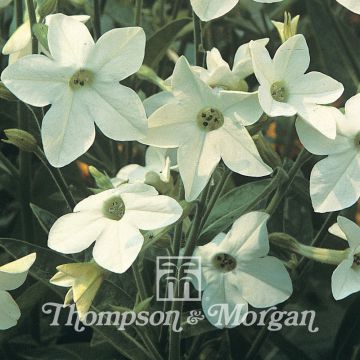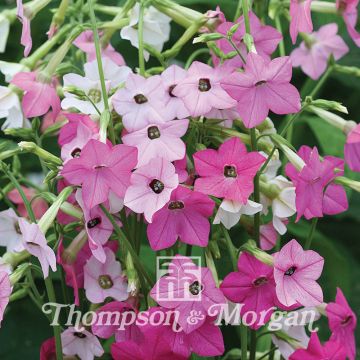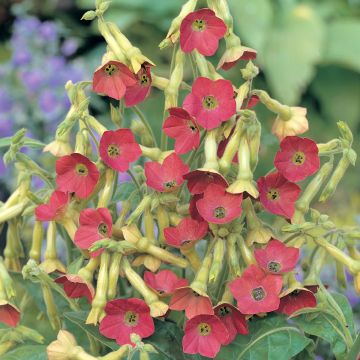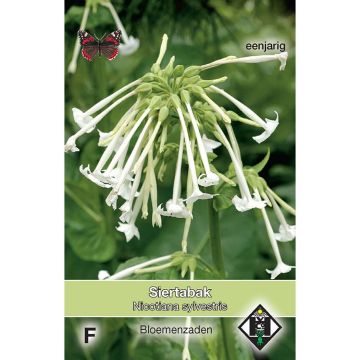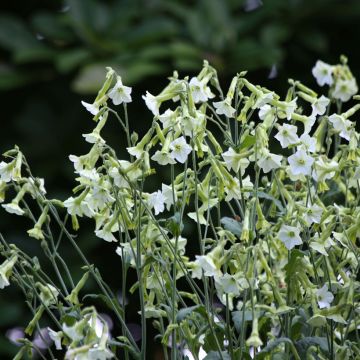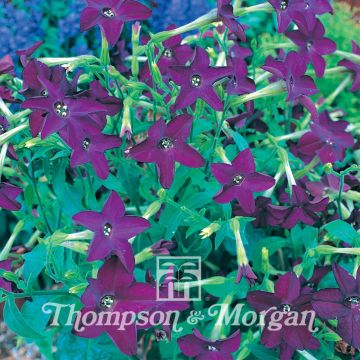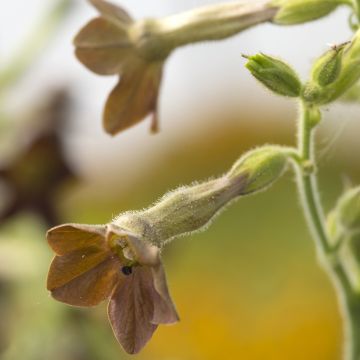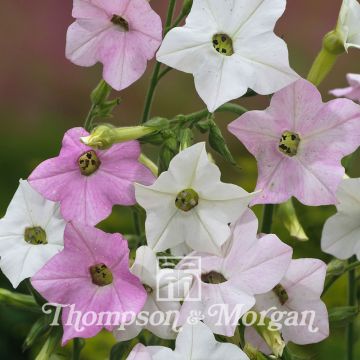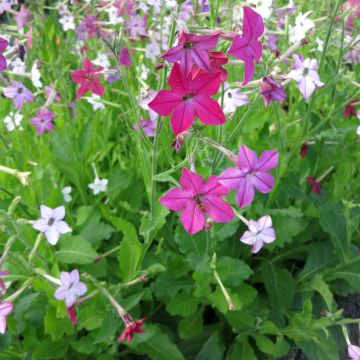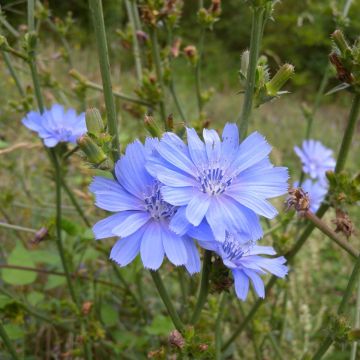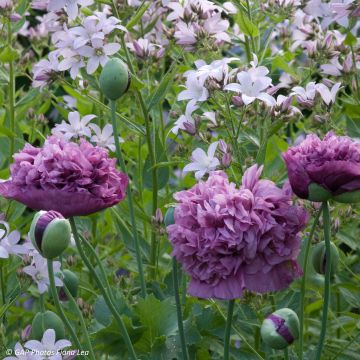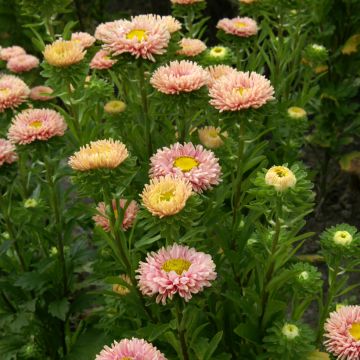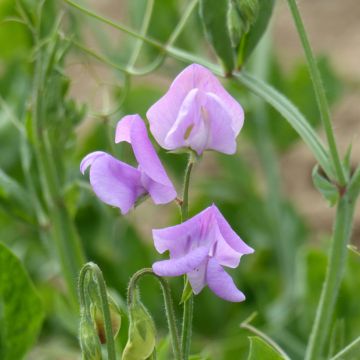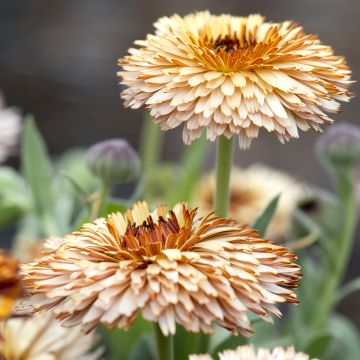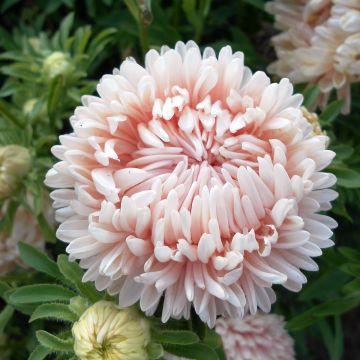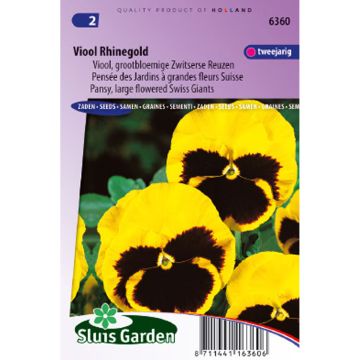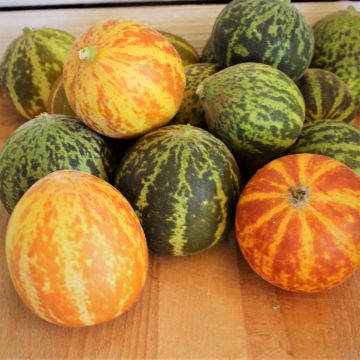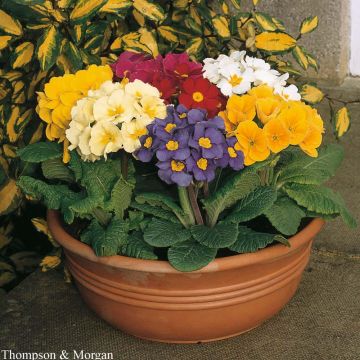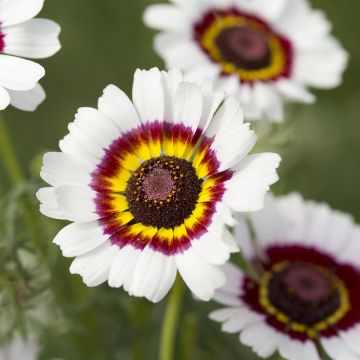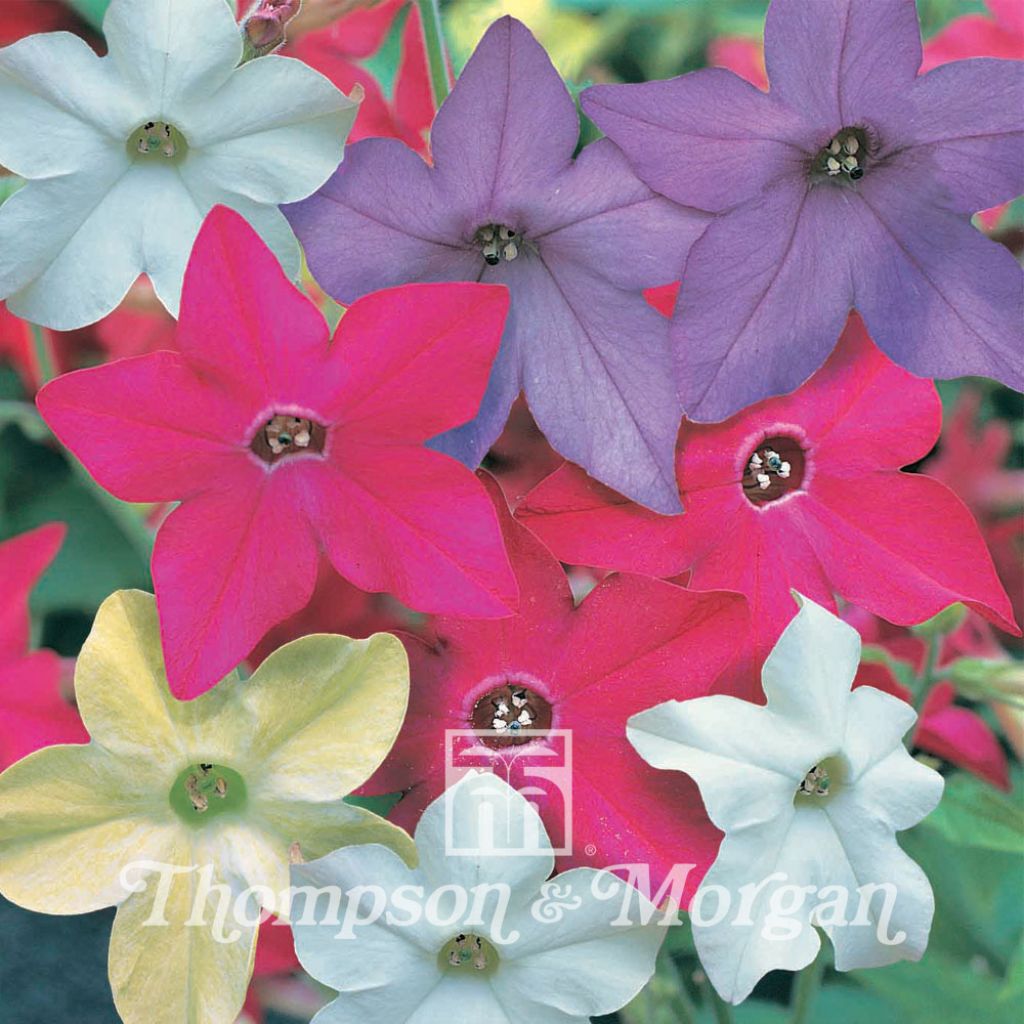

Tobacco plant Eau De Cologne Mixed F1 Hybrid Seeds - Nicotiana x sanderae
Tobacco plant Eau De Cologne Mixed F1 Hybrid Seeds - Nicotiana x sanderae
Nicotiana x sanderae Eau De Cologne
Ornamental Tobacco
This plant carries a 6 months recovery warranty
More information
We guarantee the quality of our plants for a full growing cycle, and will replace at our expense any plant that fails to recover under normal climatic and planting conditions.
Seed-only orders are dispatched by sealed envelope. The delivery charge for seed-only orders is €3.90.
Does this plant fit my garden?
Set up your Plantfit profile →
Description
Tobacco Plant 'Eau de Cologne Mixed' F1 Hybrid also known as Nicotiana x sanderae, is a blend of scented, heavy-blooming tobacco plants. This selection features plants with purple, bright pink, white or cream flowers. This selection is fairly low-growing making it ideal for large container displays or flowerbeds borders.
Nicotiana or tobacco plant or jasmine tobacco is a member of the Solanaceae family and comes from the tropical and subtropical regions of South and Central America. It is a tender, short-lived herbaceous perennial that is cultivated as an annual in temperate climates. This heavy bloomer bears flowers all throughout the summer up until the first cold spells. Still rarely used in French gardens, tobacco plants would gain to be known for the originality of their often deliciously scented flowers and the exotic touch it brings to gardens. However, be careful with its use as the whole plant is toxic for humans and pets alike.
Most species of tobacco produce flowers that open in the late afternoon, diffusing their jasmine-like scent all night long, and that close in the early morning, at first light. These plants are described botanically as being vespertine. Some hybrids now offer daytime flowering with blooms in a variety of shades.
Nicotiana unfold its inflorescences displaying loose, raceme-like cymes. The long calyx made up of 5 fused sepals, encircles the base of the corolla and once the flower wilts, contains the tiny seeds. The corolla is composed of 5 petals fused into a tube that divide, flaring sharply into 5 slightly indented lobes that form stars from which 5 long stamens shoot out. As for the leaves, they are often covered with a short glandular down which exude a viscous, sticky substance.
Nicotiana x sanderae 'Eau de Cologne Mixed' is an elegant selection that blooms all summer, from July to October, bearing a profusion of long, white, cream, magenta or purple flowers that make for colourful, wonderfully scented beds. As always, they are very easy to grow. The plant produces a mass of floral stems that emerge from the dark green clumps of leaves arranged in rosettes. This assortment features well-branched plants that form small, compact bushes reaching 50 cm high and 25 cm wide.
Nicotiana prefer full sun or light shade in well-drained soil that is always moist without being excessively so and positions sheltered from the wind. They will look wonderful in mixed borders, bed edges or in large pots on a patio. They are an unparalleled choice for scented gardens, accompanied by Mirabilis jalapa, Datura meteloides, the spider flower Cleome Colour Fountain or the Matthiola bicornis also known as Evening Scented Stock, each playing its part in an olfactory symphony.
Did you know that the way Nicotiana plants are pollinated is directly related to the nicotine content of the flowers? Indeed, research has shown that varieties with low levels of nicotine need bees, butterflies etc. to pollinate them. In fact, the scent of the flowers is supposed to attract them. On the other hand, varieties with very high levels of nicotine can be lethal to insects. They have since then adapted by turning to self-pollination. How else can this be achieved if the handiwork of the pollinator is compromised?
Warning: seeds are best meant for very experienced gardeners who are used to sowing very fine seeds. These seeds are as fine as dust and are hardly visible to the naked eye.
Report an error about the product description
Flowering
Foliage
Plant habit
Botanical data
Nicotiana
x sanderae
Eau De Cologne
Solanaceae
Ornamental Tobacco
Cultivar or hybrid
Other Tobacco seeds
Planting and care
Sow seeds from February to March on the surface of a special seed starting mix. The seeds of Nicotiana are tiny. You can mix them with a little sand for a more even distribution when sowing. Tamp them down well into the soil but do not bury them. Make sure that the soil is always moist but not wet and store them in a place where the ambient temperature is around 21-24 °C. Do not exclude light as it contributes to germination. You will see the first young shoots appear after 10 to 20 days. When they are strong enough to be handled, gradually acclimatize them to outdoor conditions. When there is no longer any risk of frost and daytime temperatures rise are above 16 °C, you can transplant them in loosened, well-drained soil.
Place in full sun or in light shade, in soil that is consistently moist but not wet, in a position sheltered from the wind, taking care to space the plants 30 cm apart.
Sowing period
Intended location
-
, onOrder confirmed
Reply from on Promesse de fleurs
Flower seeds
Haven't found what you were looking for?
Hardiness is the lowest winter temperature a plant can endure without suffering serious damage or even dying. However, hardiness is affected by location (a sheltered area, such as a patio), protection (winter cover) and soil type (hardiness is improved by well-drained soil).

Photo Sharing Terms & Conditions
In order to encourage gardeners to interact and share their experiences, Promesse de fleurs offers various media enabling content to be uploaded onto its Site - in particular via the ‘Photo sharing’ module.
The User agrees to refrain from:
- Posting any content that is illegal, prejudicial, insulting, racist, inciteful to hatred, revisionist, contrary to public decency, that infringes on privacy or on the privacy rights of third parties, in particular the publicity rights of persons and goods, intellectual property rights, or the right to privacy.
- Submitting content on behalf of a third party;
- Impersonate the identity of a third party and/or publish any personal information about a third party;
In general, the User undertakes to refrain from any unethical behaviour.
All Content (in particular text, comments, files, images, photos, videos, creative works, etc.), which may be subject to property or intellectual property rights, image or other private rights, shall remain the property of the User, subject to the limited rights granted by the terms of the licence granted by Promesse de fleurs as stated below. Users are at liberty to publish or not to publish such Content on the Site, notably via the ‘Photo Sharing’ facility, and accept that this Content shall be made public and freely accessible, notably on the Internet.
Users further acknowledge, undertake to have ,and guarantee that they hold all necessary rights and permissions to publish such material on the Site, in particular with regard to the legislation in force pertaining to any privacy, property, intellectual property, image, or contractual rights, or rights of any other nature. By publishing such Content on the Site, Users acknowledge accepting full liability as publishers of the Content within the meaning of the law, and grant Promesse de fleurs, free of charge, an inclusive, worldwide licence for the said Content for the entire duration of its publication, including all reproduction, representation, up/downloading, displaying, performing, transmission, and storage rights.
Users also grant permission for their name to be linked to the Content and accept that this link may not always be made available.
By engaging in posting material, Users consent to their Content becoming automatically accessible on the Internet, in particular on other sites and/or blogs and/or web pages of the Promesse de fleurs site, including in particular social pages and the Promesse de fleurs catalogue.
Users may secure the removal of entrusted content free of charge by issuing a simple request via our contact form.
The flowering period indicated on our website applies to countries and regions located in USDA zone 8 (France, the United Kingdom, Ireland, the Netherlands, etc.)
It will vary according to where you live:
- In zones 9 to 10 (Italy, Spain, Greece, etc.), flowering will occur about 2 to 4 weeks earlier.
- In zones 6 to 7 (Germany, Poland, Slovenia, and lower mountainous regions), flowering will be delayed by 2 to 3 weeks.
- In zone 5 (Central Europe, Scandinavia), blooming will be delayed by 3 to 5 weeks.
In temperate climates, pruning of spring-flowering shrubs (forsythia, spireas, etc.) should be done just after flowering.
Pruning of summer-flowering shrubs (Indian Lilac, Perovskia, etc.) can be done in winter or spring.
In cold regions as well as with frost-sensitive plants, avoid pruning too early when severe frosts may still occur.
The planting period indicated on our website applies to countries and regions located in USDA zone 8 (France, United Kingdom, Ireland, Netherlands).
It will vary according to where you live:
- In Mediterranean zones (Marseille, Madrid, Milan, etc.), autumn and winter are the best planting periods.
- In continental zones (Strasbourg, Munich, Vienna, etc.), delay planting by 2 to 3 weeks in spring and bring it forward by 2 to 4 weeks in autumn.
- In mountainous regions (the Alps, Pyrenees, Carpathians, etc.), it is best to plant in late spring (May-June) or late summer (August-September).
The harvesting period indicated on our website applies to countries and regions in USDA zone 8 (France, England, Ireland, the Netherlands).
In colder areas (Scandinavia, Poland, Austria...) fruit and vegetable harvests are likely to be delayed by 3-4 weeks.
In warmer areas (Italy, Spain, Greece, etc.), harvesting will probably take place earlier, depending on weather conditions.
The sowing periods indicated on our website apply to countries and regions within USDA Zone 8 (France, UK, Ireland, Netherlands).
In colder areas (Scandinavia, Poland, Austria...), delay any outdoor sowing by 3-4 weeks, or sow under glass.
In warmer climes (Italy, Spain, Greece, etc.), bring outdoor sowing forward by a few weeks.

































